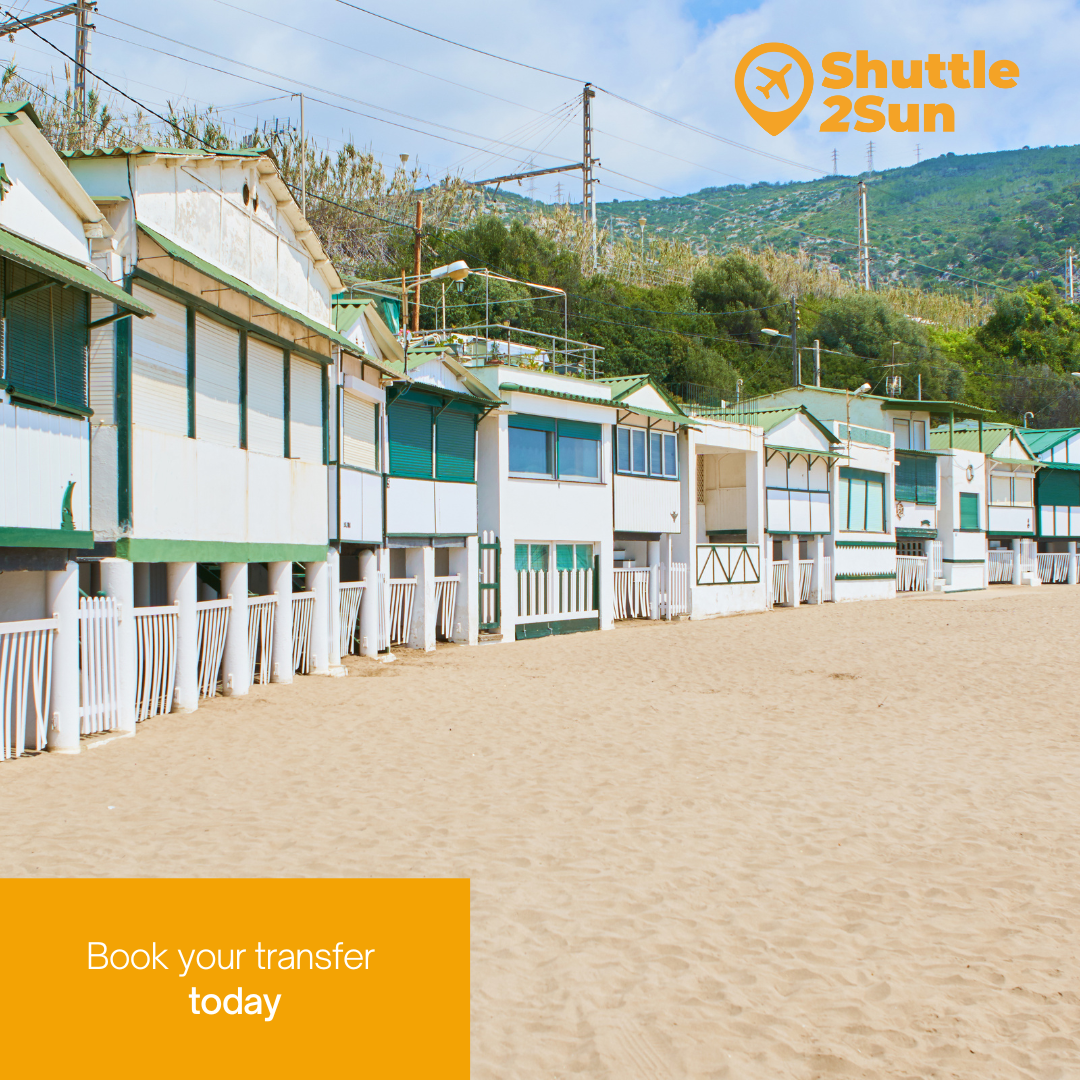The Garraf beach, located between the towns of Sitges and Castelldefels, is a hidden gem in the province of Barcelona. This area, known for its natural beauty and rich seafaring history, is home to one of Catalonia’s treasures: Les Casetes del Garraf.
These charming fishermen’s huts, located next to a golden sandy beach, offer a glimpse into the past and a unique experience for tourists looking for something more than conventional beaches. In this post, we will explore the Garraf beach, the picturesque village of Garraf, the origin and evolution of these cottages, and their relevance today.
If you want to enjoy this charming corner of the Barcelona coastline, we recommend Shuttle2Sun‘s shared transfer services and private transfer services, low-cost and sustainable, with which you can move to Garraf, from Barcelona airport, Barcelona port, Reus airport, Girona airport and Camp de Tarragona AVE train station. Remember that you can book your transfer up to 24 hours in advance.
Garraf beach and its 33 wooden huts
Garraf beach, also known as Casetes del Garraf beach, is a small coastal paradise that stands out for its tranquillity and natural beauty. Located in a cove protected by cliffs and surrounded by Mediterranean vegetation, this space offers a relaxed and picturesque atmosphere, ideal for those looking to escape the hustle and bustle of the busiest beaches.
One of the most emblematic elements that sets it apart from the rest are the 33 little green and white houses that make up its skyline. These iconic wooden huts originally served as warehouses for local fishermen and, over time, have become the beach’s distinctive symbol. Since 2020, they have been declared a Cultural Asset of National Interest, with the aim of their proper conservation.
Origin and evolution of this historic complex
Les Casetes del Garraf have a fascinating history dating back to the 1920s. Originally, these huts, built on the sand of the beach, were used to store nets, boats and other fishing equipment, as their strategic location by the sea provided quick access to the boats and allowed the fishermen to work efficiently.
Other sources explain that, in the 1920s, bathing on the beach became popular, causing wealthy families to move to the more prominent seaside resorts, such as Sitges, to enjoy a day of sun and sand.

Meanwhile, service employees chose the Garraf beach, among others, as they were not as crowded. It is said that these huts were initially built to protect these people, who came to this spot to cool off, from the sun.
However, their weak structure meant that these huts suffered a great deal of damage during storms. Years later, from 1931 onwards, these houses were rebuilt and built on pillars, which are the ones we can see today.
Over time, these huts began to transform into small summer retreats for fishing families and other local residents.
In the following decades, Les Casetes del Garraf gained popularity among the inhabitants of Barcelona and other nearby towns, who were looking for a quiet and picturesque place to escape the urban hustle and bustle. As demand increased, new huts were built and the beach infrastructure was improved.

Remember that with Shuttle2Sun‘s low-cost and sustainable shared transfer services and private transfer services, you can get to Garraf from Barcelona airport, Barcelona port, Reus airport, Girona airport and Camp de Tarragona AVE train station.
Today, Les Casetes del Garraf are a highly appreciated tourist destination, both for their beauty and for their historical and cultural value. Although some of the huts have been modernised, many have retained their original structure and rustic charm, making them a living testimony to the region’s seafaring history.
Other places of interest in the surrounding area
In addition to this original beach, the small town of Garraf has other tourist attractions that make it unique and that combine beach and mountain. One of the places you must visit if you want to enjoy a getaway in this Barcelona town is the Celler Güell, a 19th-century modernist-style winery, which was built by the renowned architect Antoni Gaudí, by order of the industrialist Eusebi Güell. Its pointed structure, built in limestone, has up to 5 floors and an underground cellar, and blends in perfectly with the natural surroundings of the town.
There is also the modern church of Santa Maria de Garraf, located in Plaça de l’Església, and the Garraf Tower, a defence tower very close to the modernist winery.
In the surrounding area you will also discover the Garraf Natural Park, with a large area of more than 12,000 hectares, where you can enjoy the outdoors while hiking or cycling. In the heart of the park, in the Palau Novella, you will find the Garraf Buddhist Monastery, the first in Catalonia.
The village is also home to several restaurants and bars where you can enjoy the local gastronomy. Fresh seafood dishes and rice dishes are particularly popular, and many establishments offer spectacular views of the sea. In addition, Garraf has small shops and markets where visitors can buy local produce and handicrafts.
Discover all the hidden corners of Garraf! With Shuttle2Sun‘s shared transfer services and private transfer services, low-cost and sustainable, you can move to this town, from Barcelona airport, Barcelona port, Reus airport, Girona airport and Camp de Tarragona AVE train station. Remember that you can book your transfer up to 24 hours in advance.



